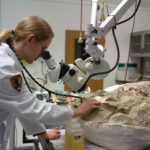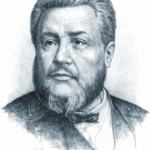 Article: “3 False Assumptions About Science” by Leah Baugh, staff writer at Core Christianity and Associate Editor of Bible Studies at White Horse Inn. She received a Bachelor of Arts in Chemistry before turning to theology and receiving a Master of Arts in Biblical Studies and a Master of Arts in Theological Studies. (original source here)
Article: “3 False Assumptions About Science” by Leah Baugh, staff writer at Core Christianity and Associate Editor of Bible Studies at White Horse Inn. She received a Bachelor of Arts in Chemistry before turning to theology and receiving a Master of Arts in Biblical Studies and a Master of Arts in Theological Studies. (original source here)
Our modern society celebrates reason and rationality as the pinnacle of man’s virtue and ability. Particularly the field of science has been influenced greatly by the idolization of reason and logic as the source of all meaningful and true knowledge. The scientific method in particular has claimed rational superiority to any other method of determining reality. It is this superiority that has been used to exclude religion or faith as a viable mode of knowledge. Science has often been used to push God out of the picture.
Part of the reason science and God seem incompatible is a misunderstanding of what exactly “science” means. Unless you’ve worked in a scientific field of study, it can be easy to simply trust the experts without knowing how to check their conclusions yourself. There are several things to note when evaluating science and what it claims to say about faith, God, and this world. Briefly, here are three false assumptions about science.
1. Scientific conclusions are made up completely of empirical facts.
The results of hypothesizing and experimenting do not just produce objective facts. The information gained through the scientific method must be interpreted and can be interpreted falsely. Physicist John Polkinghorne writes,
In the first case, the facts that concern scientists are already interpreted facts. Most of the time you can’t see directly what’s happening. You have to infer it from the things you can see, and that inference requires the use of theoretical interpretation. (Quarks, Chaos, and Christianity, 2-3)
He goes on to say that scientific conclusions are usually a mix of fact and opinion. Because of the interpretive element of the scientist, most scientific conclusions have a measure of uncertainty inherent in them.
2. The scientific method is the best method for gaining knowledge about everything.
Traditionally, science has made four claims about itself: rationality, truth, objectivity, and realism. However, these claims have been under attack, and the consensus about the ability of science to fulfill all four of these claims varies widely among scientists. The rationality of a scientific conclusion can be examined by looking at the presuppositions, evidence, and logic that went into reaching that conclusion. However, the bigger question to ask is what is the scientific method used for?
While this assumption is necessary for science to work, this presupposition itself both supports and limits science. Author Marilyn Robinson states the problem:
While the assumption of the intelligibility of the universe is still useful, it is not appropriately regarded as a statement of doctrine, and should never have been. Science of the kind I criticize tends to assert that everything is explicable, that whatever has not been explained will be explained—and, furthermore, by their methods” (The Givenness of Things, 14).
The mysteries of the human mind, the human self, history, and religion all operate outside of the basic assumption science makes in order to operate. The principle that everything is knowable only by this specific methodology is like assuming that everything can be measured by tablespoons. John Polkinghorne writes, “Science makes maps of the physical world that are reliable for some, but not every, purpose” (Quarks, Chaos, and Christianity, 7).
Limitations of science actually come from within science itself. The best example of this is Heisenberg’s uncertainty principle. Basically, the Heisenberg uncertainty principle says that you cannot simultaneously know where a particle is and what it is doing. This is just one example of the strange world we find ourselves in that sometimes is rational and predictable and other times completely bucks our theories.
3. Science determines what is possible and not possible in our world.
The other fundamental problem is that science of the kind I have been talking about captures the realm of possibility and severely restricts it. Marilyn Robinson writes, “Possibility has been captive to a narrow definition for a very long time, ourselves with it” (The Givenness of Things, 14). If we assume science is the only way to determine not only what does happen but what can happen, then our view of the world is extremely narrow. A purely naturalistic explanation of the world cannot satisfy every aspect of human life. The mind, consciousness, self-awareness, and human history refuse to be captured by a purely materialistic definition.
In many ways, the great success of science has expanded our models of reality to include multiple worlds, realms, and dimensions. This expansion only cements further the realization that our planet is radically exceptional and that “our capacity for awareness is therefore parochial in ways and degrees we cannot begin to estimate.” (The Givenness of Things, 14).
With these considerations in mind, science can be used and supported for what it is and for the good it can achieve in helping us understand our world. Trouble arises, however, when scientism exceeds the limits of its reference and purpose. We must be willing to lift our eyes above the horizon of purely naturalistic explanations as we seek to understand the complex and multidimensional world we find ourselves in.






